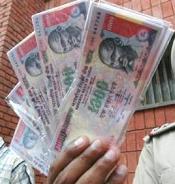 Comparisons are made between the wealth of a few and the country's GDP is like comparing apples and (say) rivers, says T N Ninan.
Comparisons are made between the wealth of a few and the country's GDP is like comparing apples and (say) rivers, says T N Ninan.
A list put out by Forbes India says that India has 69 dollar-billionaires. That gives the country a near 7 per cent share of the world's billionaires (said to total 1,011), whereas its share of world GDP is just 2 per cent, and of global poverty an embarrassing 30 per cent.
So many billionaires in the midst of a sea of poor people is, of course, a sign of inequality, and some call the contrast an obscenity.
Comparisons are made between the wealth of a few ($300 billion for our 69 billionaires) and the country's GDP ($1,500 billion this year); but this is like comparing apples and (say) rivers, because the first is stock and the second is flow.
If one must make comparisons, they have to be between the stock of wealth owned by the super-rich, and the stock of wealth that the rest of the country owns. Looked at this way, it would seem that the billionaires own barely 3 per cent of the total assets in the country, or less.
If that seems like an outrageous claim, start with the value of the 280 million head of cattle that Indians own. Assuming just Rs 10,000 per head (most cross-bred cows go for more than Rs 20,000), the value is about $60 billion. But that is small beer when compared to the bank deposits that people have; the total is about $750 billion, and a good proportion of that belongs to individuals.
But even that is small beer when you come to the value of land, of which India has 140 million arable hectares. At the acquisition price that Karnataka now has, of a mid-range of Rs 25 lakh per hectare for single-crop land, the total land value could be something like $7,500 billion. Add to that the value of all the houses (at least 100 million pucca homes), and you get another large figure.
And don't forget that the billionaires own only a fraction of the value of all listed companies (we don't know about the unlisted companies). Put all the numbers together, and it seems somewhat obvious that the billionaires own only a tiny portion of the total wealth of the country.
Still, the equality issue cannot be evaded. It used to be said of Pakistan's "22 families" (actually about 43 families, before a wave of nationalisations in the 1970s) that they owned nearly half of the companies on the Karachi stock exchange.
A quick study of India's listed stock suggests that the picture is not very different here, though you could argue that there is greater depth.
About 150 business families figure as owners among the top 500 listed companies, and therefore have some prominence. But the top 20 own 32 per cent of 1,800 listed companies, and the next 30 families own another 8 per cent.
Ownership is, of course, only one of the issues. You also have to look at market structures and, therefore, monopoly power, how cleanly the money was made (a market economy needs entrepreneurs, after all, and will anyone complain about N R Narayana Murthy becoming rich?), whether much of the wealth is inherited or self-created, and what connections there exist between business and politics.
You also have to look at tax issues, because the argument is often made that India's tax laws are kindest to the richest (no long-term capital gains tax, no dividend tax on individuals though there is a dividend distribution tax on companies, and so on).
So, there is a fairness agenda to be addressed, which is different from an equality agenda - and more urgent.